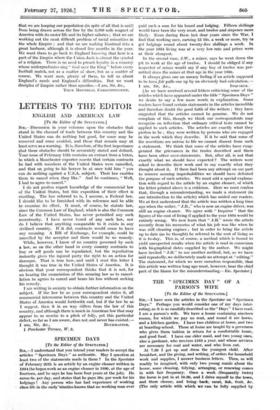LETTERS TO THE EDITOR
ENGLISH AND AMERICAN LAW
[To the Editor of the SPECTATOR.] SIR,—Discu.ssion in your columns upon the obstacles that stand in the channel of trade between this country and the United States can do nothing but good, for some may be removed and some avoided, and those that remain may at least serve as a warning. It is, therefore, of the first importance that these obstacles should be accurately stated and defined. Your issue of February 13th contains an extract from a letter, in which a Manchester exporter asserts that certain contracts he had with members of the United States were cancelled, and that on going to his lawyer he at once told him " you can do nothing against a U.S A. subject. Their law enables them to cancel when they Ince." And he continues, " Well, I had to agree to cancel."
I do not profess expert knowledge of the commercial law of the United States, but this exposition of their effect is startling. The law referred to is, I assume, a Federal law. I should like to be furnished with its reference and be able to examine its effect.. It must, of course, be statute law, since the. Common Law of England, which is also the Common Law of the. United States, has never permitted any such monstrosity. I have never heard of any such law, nor do I believe that anything comparable to it exists in any civilized country. If -it did, contracts would cease to have any meaning. A Bill of Exchange, for example, could be cancelled by the acceptor and there would be no remedy.
While, however, I know of no country governed by such a law, so on the- other hand in every country contracts to buy or sell goods can be repudiated, but the repudiation instantly- gives the injured party the right to an action for damages. That is true here, and until I read this letter I thought it was true in the United States of America. It is obvious that your correspondent thinks that it is not, for on hearing the enunciation of this amazing law as to cancel- lation he agrees to cancel and bears his loss without seeking his remedy.
I am writing in anxiety to obtain further information on the subject. If the law be as your correspondent states it, all commercial intercourse between this country and the United States of America would forthwith end, but if the law be as I suggest, then it in no way differs from the law of this country, and although there is much in American law that may appear to us unwise to a pitch of folly, yet this particular defect, so far as I am aware, does not and never has existed.—






















































 Previous page
Previous page